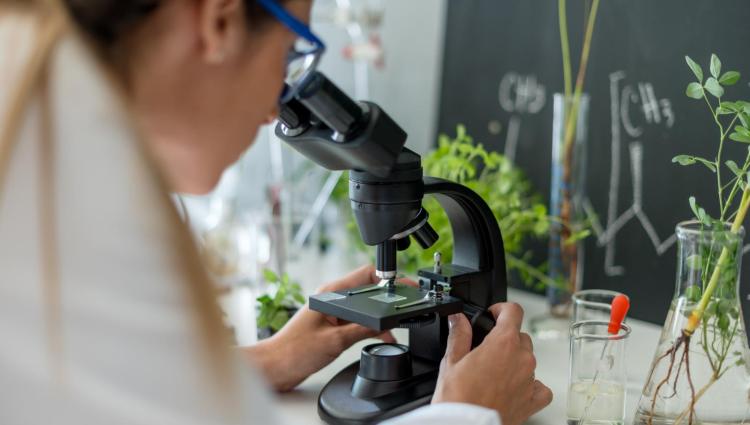Biologicals: What They Are and Their Impact on Agriculture

Joe Waddell, Director of Market Innovation, Horizon Farm Credit
What are biologicals in agriculture?
Biologicals, in an agricultural context, are products that are derived from living organisms to enhance crop growth, soil health and pest control. When discussing soil biologicals, we are taking precision agriculture to the next level by getting out the microscopes and delving into the makeup of the soil profile itself.
Is farming with biologicals a new concept?
While agricultural biologicals is not necessarily a new topic, it has seen renewed interest as U.S. farmers continue to push efficiency barriers across the ag landscape. This pursuit has led many to seek a better understanding of the relationships between the microbial activity in the soil profile and the plants growing within it. The biological space is beginning to open another door of opportunity, as they have the potential to drive efficiency, reduce use of synthetic chemistry and fertilizer, while also maintaining healthy soil profile and contributing to long term sustainability.
The data surrounding biologicals in agriculture
Data and field trials around agricultural biologicals have historically been hard to compile due to the living nature of the subject matter. Microorganisms can be easily affected by the climate around them. Too warm and they don’t survive well; too cold and they go dormant. The application window can be key to the success or failure of the selected treatment.
Historically there hasn’t been very robust data science backing up this space, but with the renewed interest and large number of investments being made, and some of the larger crop sciences companies investing in biologicals by dedicating a portfolio position to them, the data analytics side is starting to show some life. Some recent announcements include the newly formed Mosaic Biosciences which will be dedicated to bringing biological technologies to market, Syngenta Biologicals which brings together Valagro and its in-house biologicals business, and Corteva’s acquisition of Symborg and Stoller to bolster its position in the space. Agriculture biologicals are beginning to cement themselves as a core business area going forward. Several other independent companies have been making a name for themselves in the space as well. A couple to note would be: Pivot Bio with its nitrogen-fixing bacteria, and Sound with its flagship product SOURCE which works with the plants to “awaken the soil microbes” utilizing nutrients in the soil profile that aren’t readily available to the plants.
Farming biologicals and sustainability
With the excitement around biologicals in agriculture, there has been a bit of frenzy to enter the space. The discussion around sustainability may be one reason the market has gained traction over the past few years. While the synthetic portion of crop protection is heavily regulated, the biological space has a lower barrier to entry. Currently, no proof of efficacy is required, which presents both opportunities and challenges. The number of products available and the claimed benefits may make it difficult for farmers to sort through and evaluate the options and consider what effect the products may have on the broader ecosystem. As with any innovative product, there is risk associated with their use.
Getting started with agricultural biologicals
The key to successfully navigating this space is to have a have a broad understanding of soil heath profiles on one’s own farm. Obtaining and understanding base measurements are key. Those who do not have a true understanding of their soil’s current condition cannot accurately assess the benefit of any practice or product being added to the system.
Having access to better soil nutrient profile tests, including soil biologics, would significantly improve the understanding of this space. When looking at soil test results, it is important to understand the details. For example, nutrient stratification is often overlooked when assessing current soil health. There is work being done with companies like Biome Makers who are working to build out a database of microorganisms through proprietary DNA sequencing. They have built out a suite of tools to help trace biologics in the soil profile with, BECROP test, BECROP trials, and BECROP Rate.
Summary
Synthetic chemistry and fertilizers are not going away any time soon. They are the current standard that has helped pave the way for the efficiency that the U.S. ag market has been able to achieve. A door is opening, however, for the partnership between synthetics and biologicals to work hand-in-hand. Together, they could take agronomic efficiency to the next level while also producing long-term sustainability. Knowledge of how biologicals are used for farming is important to understanding the larger agronomic picture. Careful consideration of how they affect the whole ecosystem, not just the area of focus, is essential. Further due diligence is needed to really understand the overall impact this space will have on agriculture the in the coming years. Long-term field trials with third party verification will be key to defining the efficacy of biologicals.
We’ll be keeping an eye on the science of agricultural biologicals and will provide updates as more is discovered. In the meantime, if you have any questions or want to talk shop, please feel free to reach out to me: jwaddell@horizonfc.com, 814.573.8341, Joe Waddell | LinkedIn